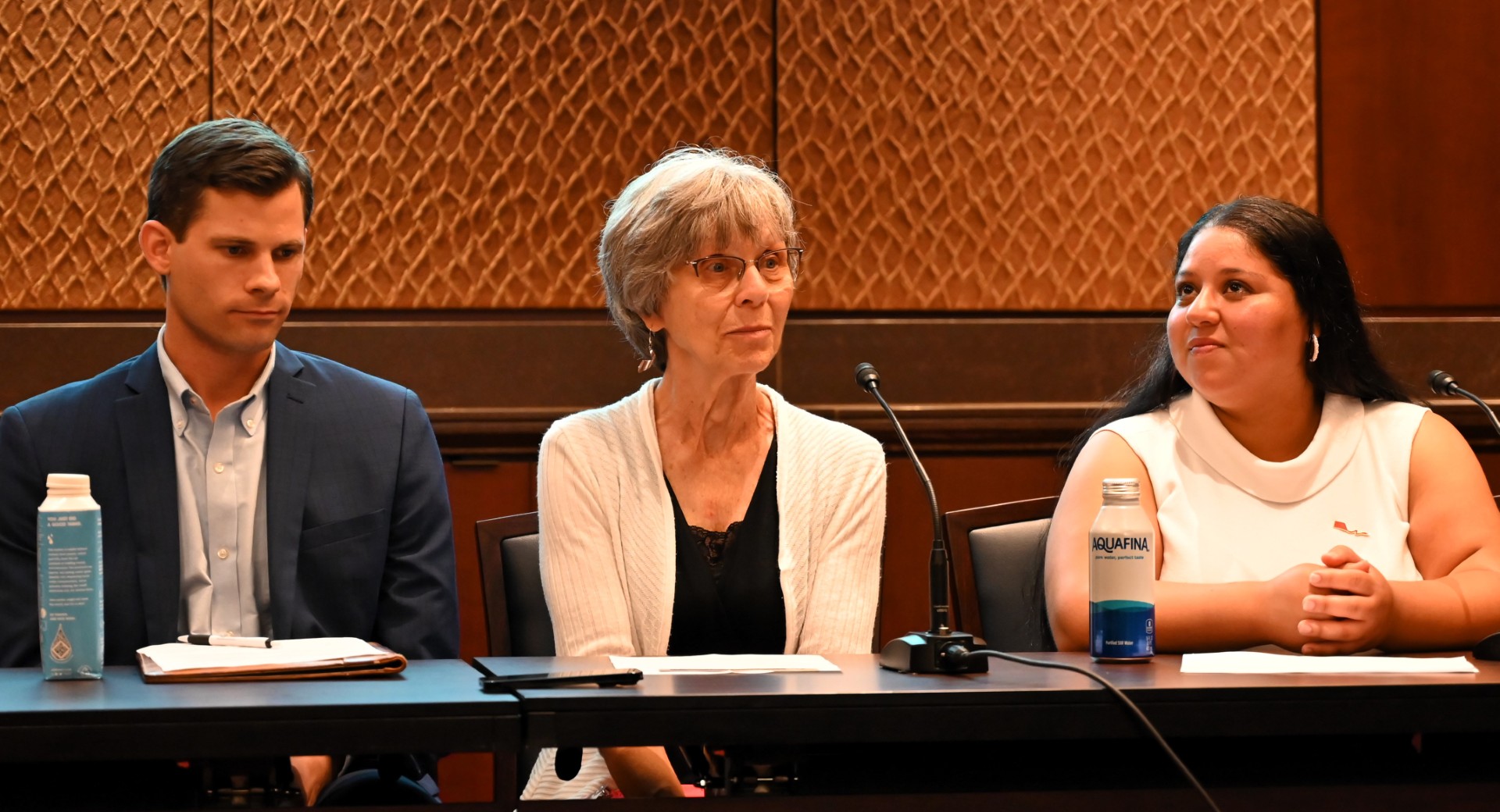 NASW co-sponsored the congressional briefing “Rooted in Change: Cultivating Youth Behavioral Wellness at Home and in Communities.” Among the panelists were two social workers, Gail L. Martin, LCSW-C, (pictured center) and Sebastian Prandoni, MSW (pictured left). Also providing testimony was Graciela Chavez (pictured right) who discussed how the Youth Villages Intercept program helped her family.
NASW co-sponsored the congressional briefing “Rooted in Change: Cultivating Youth Behavioral Wellness at Home and in Communities.” Among the panelists were two social workers, Gail L. Martin, LCSW-C, (pictured center) and Sebastian Prandoni, MSW (pictured left). Also providing testimony was Graciela Chavez (pictured right) who discussed how the Youth Villages Intercept program helped her family.
Graciela Chavez of North Carolina is a single mom to her son, Angel, whom she had at age 15. After graduating from high school, Chavez said she had little to no support. Compounding this problem was her son’s struggle with behavioral and mental health issues.
Angel was eventually referred to the Youth Villages Intercept program, an intensive in-home services program that helped Chavez and her son. Once Chavez met Angel’s intercept specialist, she said she realized she was there to help.
“She gave us the tools we needed to overcome some pretty tough obstacles,” Chavez said. “Through this program, my son was able to learn to identify triggers and come up with strategies on how to properly manage those triggers. He learned how to express his emotions. He learned how to work with challenging cognitive distortions.”
Chavez offered her comments at a congressional briefing on Capitol Hill called, “Rooted in Change: Cultivating Youth Behavioral Wellness at Home and in Communities.”
Youth Villages, a sponsor of the briefing, is a national leader in mental and behavioral health committed to finding the most effective solutions to help children, families and young adults overcome obstacles and live successfully.
Panelist Gail Martin, LCSW-C, is a retired social worker and educator who spent 23 years as a school social worker in Baltimore County Public Schools. She told attendees that social workers work in a variety of settings such as schools, prisons, hospitals, nursing homes and more.
Martin noted she was representing NASW and the School Social Work Association of America, who, along with NAMI, also sponsored the briefing.
She explained that school social workers are the main liaison among school, home and community.
“We do a lot of case management because we have those connections outside the school,” she said. “... What we do is remove barriers from learning.”
That’s their main mission so students can access education, she added. “We need a lot more attention on prevention. We need a lot more programs like Youth Villages.”
There also is a need to focus on underserved populations and rural populations and those with gaps in their insurance. More attention is needed to address the workforce shortage for behavioral health professionals.
“We need better salaries for social workers,” she said. “The federal government is the largest employer of social workers in the United States.”
Panelist and social worker Sebastian Prandoni, MSW, is a doctoral student at the University of Pennsylvania School of Social Policy and Practice.
As a social work intern, he noted his field internship was with the Social Workers Engaging in Libraries program, specifically in High Point, N.C. The program helps people dealing with symptoms associated with mental health, substance abuse and homelessness.
As an example, he worked with a person named Amy, an Army veteran, who was living in a shelter and suffering from trauma. He was able to help her find housing and build a plan that was successful for her. She told him later that she felt so much better than when she first walked in.
“She said she felt seen and heard,” Prandoni said.
When working with a population that is unhoused, 80 percent of them suffer from some sort of trauma, he said. Building trust with this population takes time.
“My time (in the library program) made me aware of where our gaps are in our services and how we can build our local community service providers so that people do not fall through the cracks,” he said.
“We are asking for an investment in creating a pipeline that can develop a specialized workforce that can meet people’s needs where they are.”
The honorary co-hosts of the briefing are members of the U.S. Senate Mental Health Caucus: Sens. Alex Padilla, D-Calif, and Thom Tillis, R-N.C.